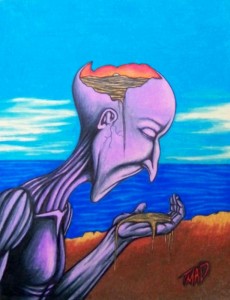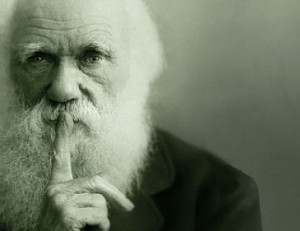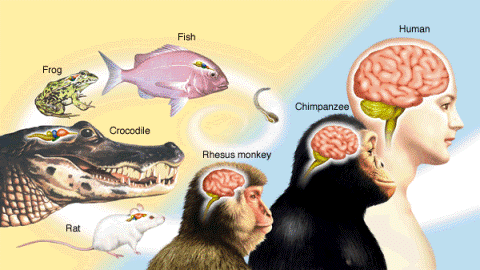An explanation, however cogent, of how humans came to operate in opposition to nature, from which Homo sapiens arose like all other life, can’t change the explained. But a new theory of human nature may be useful in understanding the seeming mistake of ‘man.’
 More importantly, it may spur an inquiry into what a transmutation in the human brain may mean, and how attention to the movement of thought could bring it about.
More importantly, it may spur an inquiry into what a transmutation in the human brain may mean, and how attention to the movement of thought could bring it about.
My basic premise is that ‘higher thought’ (i.e. symbolic thought) is inherently separative. Conscious thought is essentially an adaptation that allows humans to remove ‘things’ from the environment, and manipulate them in a countless number of ways.
Evolution doesn’t employ time to reach goals. But over time, the hominid brain became more and more capable of removing things, generating symbols, storing information and communicating increasing knowledge to succeeding generations. With the evolution of modern humans about 100,000 years ago, a breakthrough occurred, and consciousness as we know it explosively emerged.
The problem with ‘higher thought’ is its tendency to mistake its separations for actuality, and to psychologically separate—that is, divide. That was OK as long as humans lived close to nature, and had a lot of room for error. But as man ‘conquered’ nature more and more, it became problematic, to say the least.
Self-centeredness, power, domination and mass manipulation also increase when thought-consciousness is primary. And now, as corporate globalization threatens the viability of life on Earth, radical change is essential.
From an evolutionary perspective, how did humankind get into this mess? As I see it, without a deep and abiding insight into thought’s nature, which changes the emotional perception of our place in the world, thought inevitably produces more and more division and fragmentation, until an implacable ecological crisis ensues.
With globalization, there is no way back to a more balanced time, nor can the few remaining pockets of local control be preserved and protected from the juggernaut of fragmentation. The only way ahead is transmutation, which, ironically, is being driven by the self-made crisis.
Of course, that could take hundreds of years, which is nothing even on human timescales. And since Homo sap is still heading headlong in the direction of darkness, the key, as zombies continue to proliferate, is for enough of us to remain inwardly alive to still make the transmutation of the species possible at some point in the  unforeseeable future.
unforeseeable future.
Scientists say that the human brain is the most complex system that nature has devised on this planet. Philosophers say that ours is a problem solving brain. The former is false pride (after all, what did humans have to do with the evolution of the brain?), while the latter misses the point.
Certainly thought conceives or creates problems, and then solves them—in the process generating more problems. Even pure science can be viewed as problem solving—posing the right questions about phenomena in order to solve how things work in nature. But what if the problem-solving mind is the problem itself?
In other words, is that all the human brain is—a problem solving mechanism? If so, what about the problem that symbolic thought poses to the planet and itself? Humankind is decimating species at a rate comparable to the great extinctions caused by asteroids eons ago. How and why could evolution make such a mistake?
Like the Sorcerer’s apprentice, thought cannot stop separating, dividing and fragmenting. That’s why many ancient traditions speak of quieting the mind. The plethora of meditation practices and techniques seek to bring about a stillness of the mind, and with it wholeness and peace. But all techniques and methods are themselves the product of thought, as are beliefs and religions.
So is the human brain merely the consciousness that thought produces? Or does it have another capacity altogether? Yes, the brain has a tremendous capacity for awareness, with which, paradoxically, the evolution of thought endowed us.
Is self-awareness in the deeper sense of the term an exaptation of thought? That is, having served utilitarian separation but leading to planetary fragmentation, can self-awareness as separateness consciously be shifted to serve self-knowing and wholeness?
That points to the root of the tremendous mistake that is divisive-minded ‘Man,’ and to the possible resolution of fragmentation that the whole human being affords. The word ‘mistake’ is somewhat rhetorical on my part, a different way to think about the human condition. In one sense, the ‘mistake’ of humankind isn’t ours, but evolutions’, since apparently the strong tendency toward division and fragmentation is inherent in the evolution of symbolic thought itself.
So is the evolution of conscious thought, though it carries the risk of fragmenting the planet all to hell, a necessary stage for the emergence of another order of consciousness, based on awareness and attention rather than symbol and memory?
Clearly, the evolution of symbolic thought, though it appears at this juncture to be a monumental mistake, gave the brain the raw material (literally, the gray matter and neuronal complexity) for awareness of the infinite.
But we have to resolve the riddle within ourselves, not philosophically, by reinventing the wheel of these  insights, but through attention to the separative movement of thought/emotion, beginning by ending the infinite regress of the observer in passive awareness.
insights, but through attention to the separative movement of thought/emotion, beginning by ending the infinite regress of the observer in passive awareness.
In terms of evolution, a million years is like a minute in human time. The hominid brain first began to unconsciously extract and manipulate ‘things’ in the environment only about three million years ago, when the first durable tools were conceived. That began the path to conscious thought.
A threshold of consciousness was crossed, many paleo-anthropologists believe, with the progenitors in Africa of Cro Magnons some 300,000 years ago, which allowed diverse cultures, art, and probably fully articulated language to explosively emerge.
Given that symbolic thought contains within it the inherent tendency toward division and fragmentation, and that the present global ecological, spiritual, economic, political and cultural crisis is the extreme expression of this tendency, then only a breakthrough into another kind of consciousness altogether can liberate humanity.
Humans are creatures of words and images, and mediate experience through symbols. In the meditative state however, words fall silent and symbols fall away. In complete awareness, the brain is simply still and awake, a state of negation spontaneously begins, and thought assumes its rightful place.
So when the brain becomes deeply aware of and attentive to the movement of thought, undivided observation acts on its movement, quieting it. The entire cognitive apparatus in the brain falls silent, and remembering, associating and even recognizing cease. One sees anew, and there is a restoration of innocence that’s deeply regenerative to the brain and body.
Insight affects the brain–not just the software, but the hardware as well. Therefore a deepening insight into the nature of thought, through observation and self-knowing is indispensable to the resolution of the crisis of consciousness.
Taking time daily to simply observe the movement of the mind transforms thought-consciousness, or at least helps prevent one from becoming a zombie, providing the entry point within the individual (literally, undivided person) into another order of consciousness altogether.
Martin LeFevre

